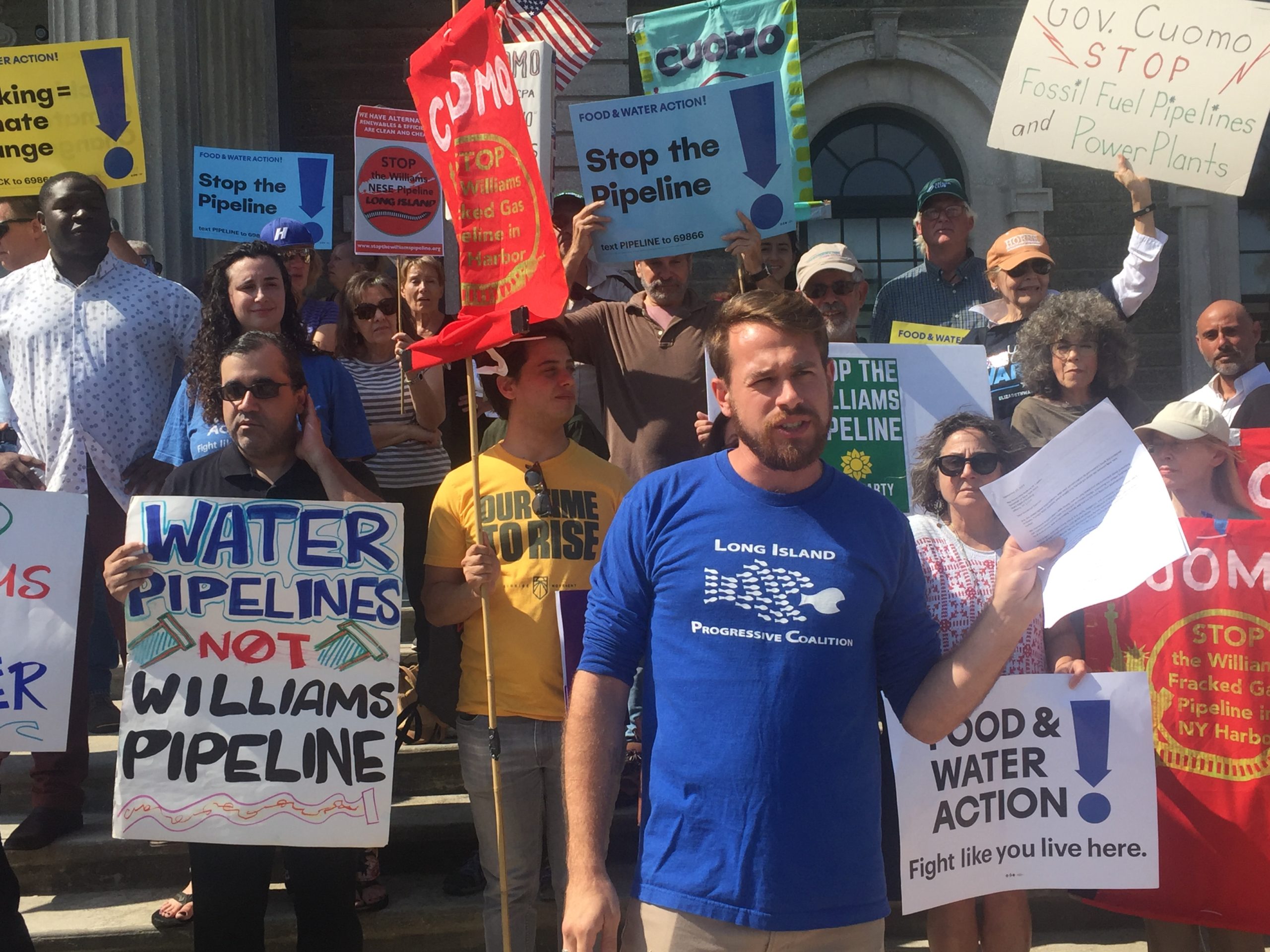Environmental activists called a gas permit halt by National Grid in the wake of the delay of a multistate pipeline project unnecessary and “bullying tactics” on the steps of the Theodore Roosevelt Legislative Building on Monday.
In May, National Grid announced to municipalities on Long Island and in New York City that gas permits would be withheld after a natural gas pipeline project was denied by the state.
The project’s opponents say that there is no need for the project, and the halt is a move by National Grid to get the state to approve the project and keep ratepayers dependent on fossil fuel for energy.
“When the Williams Company and the corporate utilities insist that this pipeline is necessary for development projects while refusing to provide evidence of need, keeping local businesses and communities beholden to their dead-end business model,” said Ryan Madden, spokesman for the Long Island Progressive Coalition, “what we hear is a lack of responsible investment, a denial of the reality of the climate crisis, and the perpetuation of a status quo that enriches fossil fuel companies at the expense of future life on the planet.”
He said that National Grid has launched an “aggressive campaign” to support the Williams project, buying radio ads and encouraging customers to lobby politicians.
Activist Laura Shindell, a spokeswoman for Food & Water Action, who nicknamed the utility company “National Greed,” said that the company’s cited need for the pipeline project is “flat-out false,” saying that the project would still take a year or more to be completed.
The company “claims that it doesn’t have enough gas to hook up its customer because of the recent pipeline denial,” Shindell said. “First of all, if the pipeline had been approved it wouldn’t have been built and become operational for at least another year.”
Shindell said National Grid sold $284 million of natural gas to third-party companies between 2014 and 2019. She said this contrasts with a Federal Energy Regulatory Commission rule that allows off-system sales only if a utility company has a long-term surplus.
She called the gas permit moratorium “corporate bullying,” saying, “National Greed is abusing its monopoly power, using businesses and ratepayers as its pawns.”
Shindell said that New York Attorney General Letitia James’ recent call to investigate National Grid’s gas moratorium and its needs will reveal that there is no need for the step.
The Williams pipeline project to provide additional capacity to customers in Brooklyn, Queens and Long Island is a pipeline proposed by Transco that would deliver natural gas from Pennsylvania through New Jersey, then underwater through Raritan Bay and Lower New York Bay to about three miles off the Rockaway Peninsula in Queens, where it would connect with existing infrastructure.
On May 15, the state Department of Environmental Conservation rejected the project due to developer Transco’s “inability to demonstrate the project’s compliance with all applicable water quality standards.” The transportation system involves 23.5 miles of underwater pipeline, of which some 17.4 miles would be in New York waters.
Transco submitted a new application for a water quality certification on May 17.
The project developers said they are still confident that the project will be done by late 2020 or early 2021.
National Grid’s response to the event is that it is trying to go with cleaner energy by taking more natural gas from the pipeline project.
“National Grid supports local, regional and federal clean energy goals for reasonable methods to help achieve emissions targets in a reliable and affordable way for consumers,” National Grid spokeswoman Karen Young said in an email. “We believe natural gas plays a critical role as part of the roadmap to achieve an aggressive reduction in greenhouse gas emissions.”
Young said that more access to natural gas will result in reduced emissions in the Northeast by reducing the use of more carbon-intensive fuels, like oil and propane.
“We believe the Northeast Supply Enhancement Project is vital and necessary to provide consumers with access to natural gas supplies, which is the most cost-effective and environmentally sound heating option available to heat homes and run businesses,” Young said.
According to DEC spokeswoman Erica Ringwald, the department will make its determination on the new application on or before May 17.



